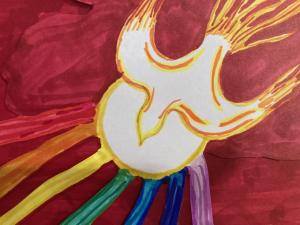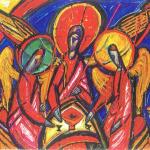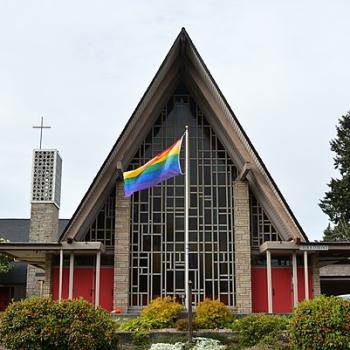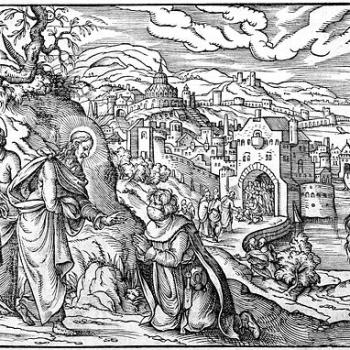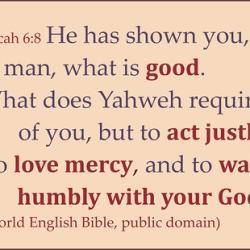The Queerest Holiday
Pentecost is the queerest holiday of the liturgical year, and the Church should celebrate it as such.
The Holy Spirit is weird, wild, and wonderful. It defies explanation. And at Pentecost, it descends in tongues of fire and gives the apostles the ability to speak different languages.
How queer is that?
It’s also “queer” because it unconditionally affirms all people. All classes, races, genders, sexual orientations, abilities. The Spirit honors all ways of being human.
So it’s fitting that the season of Pentecost begins in the midst of Pride. Both affirm the irrevocable dignity of all.
But the Church hasn’t made this clear. Too often the Church has followed not the Holy Spirit of Love, but the satanic spirit of demonization. Notions of a wrathful God have twisted the Good News into terror.
It’s long past time for change.
Pentecost has been explained as the healing of Babel, when scattered peoples became reunited in the Spirit. But as long as churches exclude and shame the LGBTQIA+ community, the unity of the Spirit still eludes us. To live in the Spirit and truly heal, we must see through the lens of Love the Spirit gives us.
When we understand the story of Pentecost — from Babel to the birth of the Church — through the lens of Love, we discover that exclusion is impossible, because we’re all already enfolded in Love’s embrace. And we realize that if the Church lived in the Spirit of Love, it would unconditionally affirm the LGBTQIA+ community.
Babel: A City Built On Sacrifice
What does the Tower of Babel have to do with affirming the LGBTQIA+ community? Quite simply, it’s the story of God thwarting the sacrifice of the most vulnerable.
Scripture is better understood as story, not history. It gives a window into an ancient people’s struggle to understand God’s relationship with humanity in a precarious world. And it reveals the human tendency to conflate God with violence as well as God’s self-revelation of unconditional love. The story of Babel contains human misunderstanding, also but hints at the deeper truth that God desires mercy, not sacrifice.
The story of Tower of Babel gives us insight into how ancient peoples learned how to survive world-upending violence. The people of Babel are rebuilding after a flood of human violence, thought to be divine, swept most of the world away. Survivors of world-upending violence are often homeless and orphaned, severed from family and community. Thus, the desire of the people to build a tower to the heavens “lest they be scattered” is really the desire to protect themselves from the escalating, all-consuming violence that dominated the earlier chapters of Genesis.
And, according to French philosopher René Girard, the ancient stop-gap mechanism for keeping violence from spiraling out of control was the sacrifice of a scapegoat.
All humanity is cramped into one place, sharing not only the same language but the same resources, needs, and desires. Inevitably, they fought over what they refused to share. But channeling their rage onto a scapegoat turned the violence of all-against-all into all-against-one. People were brought together against a common enemy. The self-righteous catharsis of killing that enemy together produced a seemingly god-given peace that obscured the very fact of its violence from its practitioners. Ritualized sacrifice thus became a cornerstone of civilization, instilling a sense of order and common purpose.
And sacrifices were often done “close to the gods” on mountaintops… or towers.
At Babel, the people attempted to build a city on a foundation of sacrifice.
And God said “No.”
At first glance, God appears vindictive, furious that humanity is “invading” divine territory. But left unsaid is that this tower is almost certainly being built at the expense of the poor and vulnerable and over the literal dead bodies of sacrificed scapegoats.
Who were sacrificed?
The vulnerable and defenseless, with few ties to community. Those who did not conform to standards of aesthetics (disabled or deformed) or behavior were prime targets as well.
Conformity is not community. Sacrifice is an unstable foundation for civilization. And what was thought to be the punishment of an angry God could instead be seen as the intervention of a concerned God who wanted to give the people an opportunity to spread, grow, diversify, and learn to appreciate the differences that make the world thrive.
Love Is The Universal Babel Fish
At Pentecost, the scattered peoples gather in Jerusalem, and the Spirit suddenly strikes the apostles with the ability to speak to them in their many diverse languages. What is going on?
Those who are multilingual know what it’s like to communicate in a language that doesn’t have quite the right words. Every language is shaped by its culture, and words have shades of meaning. Words of a common language can’t express the richness of the speaker’s imagination like their native tongue. All the people gathered at Pentecost were Jews who could communicate in Greek, the common tongue of the Hellenized world. But they could never convey their fullest selves.
But at Pentecost, the apostles become capable of fully acknowledging and communicating with others. The people who hear them are shocked to feel seen in their fullness.
That’s the gift of the Spirit. It’s the love that allows us to be our fullest selves and acknowledge others in their unique beauty. It’s not a love that erases diversity, but one that brings diversity in all its intricate detail to the forefront.
Love is the universal Babel Fish, empowering us to understand and appreciate one another not just across language, but across all differences.
And that’s why Pentecost is a day of universal affirmation for all identities. The Spirit is poured out onto “all flesh” — flesh of all colors, genders, sexual orientations, and abilities. Differences that could divide instead invite opportunities for understanding and connection.
Living in the Spirit means living in gratitude for the wondrous array of diversity in the world, including diverse ways of living, loving, and being human. It means no one is singled out for condemnation or persecution. It’s the rejection of the flimsy and fractured way of forming community on scapegoating and sacrifice. And it’s building the Beloved Community by celebrating our connection as unique individuals made to love and care for each other.
Without Love, It’s All Just Babble
But too often the Church still lives by sacrifice, not mercy. When the Church condemns those who do not conform to their heteronormative or cisgender standards, it does not know the spirit from which it speaks.
The LGBTQIA+ community continues to be sacrificed on the altars of religious self-righteousness. They are still expelled from their families. They are targets of both illegal and legislative discrimination and violence.
And many suffer unnoticed, silenced into conformity.
But the Spirit empowers silenced voices to cry out and be heard.
When the Church lives in the Spirit of Love, it will fully embrace the queer community. It will affirm the full dignity of all and challenge and transform systems of oppression in the name of Love. Everyone will be seen and loved for their indispensable uniqueness and beauty.
Until all are fully embraced, all talk of love is still just babble.
Image: Artwork by Lindsey Paris-Lopez, inspired by Holy Spirit: Wilderness Guide of Love (receive and enter) on Google Images

